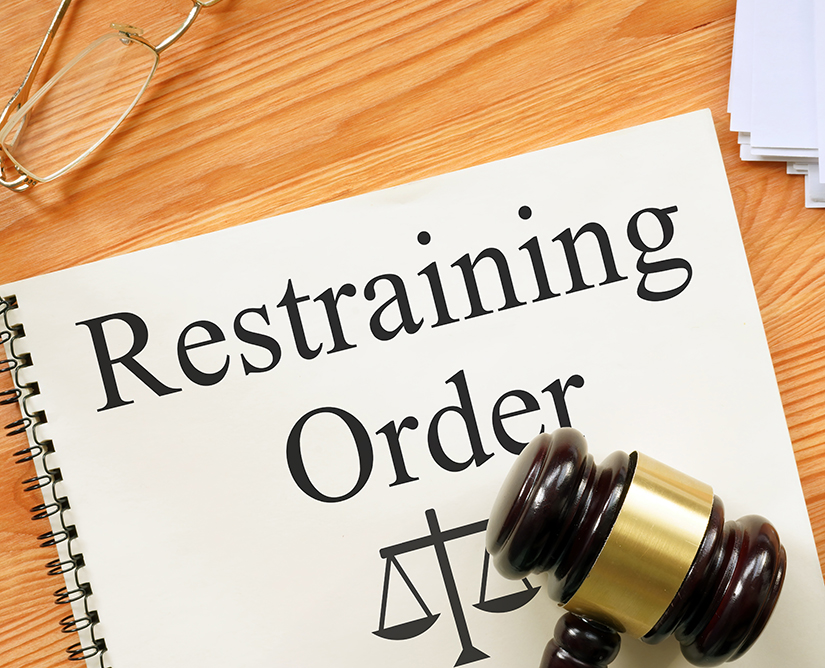Oakland Restraining Order Lawyer
124+
Reviews







When someone else’s actions are making things difficult for you or your family, you may feel like you no longer have control over your life. You should never feel like that. We utilize the court of law to help people like you regain control of their life so they can focus on what’s most important to them.
Are you bothered by the fact that another person has taken it upon themselves to derail your life? Maybe they’re harassing you and you need help making them stop; or, maybe they are filing a restraining order against you out of spite to disrupt your career. How do you make it so this other person no longer has such a strong stranglehold on your livelihood? Where do you turn to for help?
Here. You’re already in the right spot.
Restraining orders, whether requesting protection or defending against a restraining order filed against you, are an area of the law that requires a knowledgeable and trustworthy Oakland restraining order attorney. When aiming to defend your freedoms and challenge a possible restraining order, you need an attorney with that will support you every step of the way in a professional manner, offering advice and representation that protects your best interests. Our team at The Nieves Law Firm has substantial experience with restraining orders and we may be able to help you with your situation.
Restraining orders are intended to shield the protected party from abuse, threats of violence, and ongoing harassment by the restrained party. Restraining orders can prohibit conduct such as impermissible contact and communication including, but not limited to, phone calls, text messages, e-mails, and social media interactions.
While you do not technically need to hire an attorney to request or contest a restraining order, there are many benefits of working with an Oakland restraining order lawyer, including:
While restraining orders may seem like very straightforward actions, the technical aspects of them make them difficult to fight without the experience an attorney could provide. First and foremost, you will need to know what type of restraining order to file. There are actually four different types of restraining orders you can file in California (we go over them below). Failure to file the correct restraining order could result in a denial of the order. On top of that, you need to show the judge specific evidence that warrants them granting the restraining order (if you are filing) or provide evidence showing why the restraining order should be invalid (if you’re contesting a restraining order).
There is also a hearing that takes place which will either be a short or long-cause trial. At this bench trial you may need to prepare witnesses, have an understanding of evidentiary codes and the burden of proof for your restraining order type, know how to cross-examine witnesses, know how to prepare your argument (including and opening and closing argument), and understanding how to make objections during the hearing. While you do not need to have an attorney, having one on your side greatly increases your chances of successfully navigating the restraining order process and understanding the procedures.
In the event the case does not go to trial and the parties are willing to mediate, an attorney will be able to present your terms on your behalf, speak with the opposing side and the mediator about your goals, and advise you on whether the mediated terms accomplish a better outcome than going to trial. Ultimately, the decision to mediate or push for trial is up to the client but an attorney can help make the process streamlined, provide clarity, and interpret legal jargon in the agreements to ensure that your interests are protected.
To be successful in your pursuit of a restraining order, you must file the correct type of restraining order depending on the specific situation you are in. In California, there are four different types of restraining orders that you can file.
This type of restraining order is the most common and is issued when you are being harassed, stalked, abused, or threatened by a person that does not have a close relationship with you, like a neighbor, stranger, or friend.
This type of restraining order is issued when there is alleged abuse between two parties who are or were in a “close relationship.” Examples include a spouse, an ex-partner, the other parent of a shared child, and close relations by blood, marriage, or adoption.
This type of restraining order is issued when an elder (65+ years old) or dependent adult (18-64 years old with mental or physical disability) needs protection from harassment or abuse from another individual.
This type of restraining order is only available for employers and can only be issued if the employer has received credible evidence that an employee is subject to harassment or abuse by another individual while in the workplace.
Our Oakland restraining order attorneys have been successful in the pursuit of every type of restraining order listed above. We understand how these restraining orders work, the applicable law, and what judges look for in these cases. We’ve tried hundreds of restraining order cases, and we would be happy to help you in your pursuit of a restraining order.
There are a number of legitimate defenses to combat a request for a restraining order that can help protect your liberties and safeguard your valuable reputation against false claims. Here at The Nieves Law Firm, our Oakland restraining order attorneys know that it is possible that the alleged conduct never occurred or that there is a clear justification or excuse for the conduct. Oftentimes, we encounter situations where the restrained party is actually the victim and a countersuit is needed to highlight the abuse or harassment that has been perpetrated against them. Our skilled attorneys can help with mounting defenses that include:
The ultimate goal of any restraining order is to protect an individual from harassment, abuse, threats, or stalking. The “protected person” in a restraining order is the individual making the request for the court order. The individual that the restraining order is brought against is considered the “restrained person.”
In essence, a restraining order protects an individual from another person by ordering the restrained person to stop a variety of activities, which will be listed in the court order. Some common examples of things a restraining order may protect a person from include:
Restraining orders can also order the restrained person to do specific things or stay away from specific areas related to the protected person. For example, a stay-away order could require the restrained person to stay at least a certain distance (typically 100 yards) away from the protected persons work, home, their children’s school, their children’s daycare, etc.
Similarly, a restraining order could require the restrained person to move out of a home where the protected person lives. While a restraining order can be very beneficial to the protected person if there is activity that warrants a restraining order, it can also be devastating if someone is making false allegations in attempt to negatively impact another person’s life. We sometimes see these in former domestic relationships where a partner is trying to get back at a former partner or obtain leverage in a child custody case. If you have been served a restraining order and you need help contesting it, contact a restraining order attorney in Oakland on our team.
If you have been served with a restraining order, it is important that you do not violate any of the stipulations laid out in the order as that could lead to severe legal consequences. According to Penal Code 273.6, it is considered a misdemeanor to violate a restraining order and is punishable by up to one year in jail and a fine of up to $1,000, or both.
If the violation of the restraining order results in physical injury, however, you are subject to a fine of up to $2,000 and/or imprisonment in a county jail for no less than 30 days and no more than one year. Other aggravating factors, such as prior protective order violations or violations that involve a credible threat of violence can lead to additional penalties.

The Nieves Law Firm is dedicated to providing aggressive criminal defense representation to working professionals who have found themselves in trouble with the law. We show up to win, and we’re not afraid to fight aggressively to accomplish our client’s goals.
We understand that being accused of a crime can be a scary and confusing experience. That’s why we take the stress off our clients by handling the full scope of their legal situation from the initial consultation to the final outcome. Our bilingual attorneys and staff are here to ensure that our clients feel heard and understood every step of the way.
As one of the largest criminal defense teams in Oakland and the Greater Bay Area, we have the resources and experience to handle even the most complex cases. Our experienced team examines various aspects of your case and, perhaps most importantly, we genuinely care about our clients and their future. We take the time to learn about their goals and priorities so that we can achieve an outcome that allows them to move past their mistakes and focus on the future they want. When you work with us, you become part of our team.
Our skilled criminal defense attorneys have experience handling a wide range of criminal cases. With a deep understanding of the legal system and a track record of successful cases, our lawyers are committed to achieving the best possible outcome in your case.
When facing a criminal charge, having dedicated and experienced attorneys on your side is critical. At The Nieves Law Firm, we understand the gravity of your situation, and our criminal defense attorneys provide unwavering support and legal guidance.
From the moment you reach out to us, we prioritize your well-being and legal interests. Our criminal lawyers are with you every step of the way, from arrest to hearings and beyond, to ensure that your rights are protected. Whether you’re facing charges related to DUI, drug offenses, assault, sex crimes or any other allegation, we have the knowledge and courtroom experience to fight vigorously on your behalf.
We believe in the power of collaboration and will actively involve you in the decision-making process, ensuring you are well-informed and empowered to make the best choices for your defense. Our goal is not only to navigate the legal complexities but also to provide you with the peace of mind and reassurance you deserve during this challenging time.
Give us a call or contact us online so we can schedule a meeting to discuss your legal needs.
Schedule a meeting with our intake coordinator so we can determine the best plan to solve your legal problems.
We work to resolve your legal problems so you can focus on what is most important
One question we often receive from individuals who need assistance filing a restraining order in Oakland is, “How long do restraining orders last?” Like most things in the legal field, it depends on the specific situation. Specifically, the amount of time a restraining order will last depends on the exact type of restraining order you have. Restraining orders in California can be broken down into three categories based on the amount of time they are in effect for.
A question we often hear from individuals contacting our firm for assistance contesting a restraining order filed against them is, “Can I file a counter restraining order against the person who filed against me?” The simple answer is yes, you can file a counter restraining order as long as you can prove you meet the requirements for the specific type of restraining order you are filing. You should not simply file a frivolous action just to be retaliatory.
It is important to note that you will be held to the standard of proof that is required for the specific type of restraining order you are filing. For example, individuals looking to file a domestic violence restraining order (DVRO), you must show that there is reasonable proof that a past act of abuse occurred by an intimate partner. If you are filing a Civil Harassment Restraining Order (CHRO), you must show by clear and convincing evidence that there was a credible threat of violence, actual harm and fear of future harm if the court does not intervent, or a continuous course of conduct that seriously annoys, harasses, or alarms and serves no legitimate purpose. The definitions of the associated burden of proof terms are not always in line with the everyday perception of what a word may mean. For instance people often think of “abuse” to mean physical violence when “abuse” encompasses disturbing the peace. These legal requirements can be tricky and it’s critical to invest in the aide of an experienced restraining order lawyer to help – especially where there are competing requests.
Another common question we receive related to restraining orders is, “Who can I list as a protected party?” Well, a number of different people or parties can be protected through a restraining order. Some of the most common examples of protected parties we have seen on restraining orders include:
In some instances, you may be able to recover attorney fees if you are the prevailing party in a restraining order case. For this to happen, however, a judge must grant attorney fees and costs related to the restraining order. While it is not guaranteed in every case, we have been successful in our pursuit of attorney fees for a number of clients.
For example, if you are a respondent in a restraining order and the judge found that your conduct did not warrant a restraining order, they can require the petitioner to cover your costs. On the other hand, if you filed a restraining order out of necessity due to the situation you were in, the judge may order the other party pay your attorney fees because you prevailed as the protected party. Attorneys fees decisions are often based on whether there was bad faith in the filing of the action, the ability to pay, the prolongation of the matter, the novelty of the subject, and the reasonableness of the fees.
Individuals who were served with a domestic violence restraining order are often concerned about any relating criminal charges. One question we often receive is “If I am served with a domestic violence restraining order, does that mean I am being charged with domestic violence?” The simple answer is no. A domestic violence restraining order and domestic violence criminal charges are two different processes. Only the district attorney (DA) can determine whether or not criminal charges will be filed against you. In this sense, they will make a determination about whether the conduct that led to the restraining order constitutes domestic violence charges if it was reported to the police.
However, just because the processes for these are different does not mean you will not be charged with domestic violence. The district attorney has a specific amount of time after receiving evidence of misconduct to file criminal charges. These are known as the statute of limitations, and they dictate the timeframe for criminal charges to be filed. For most misdemeanors, the statute of limitations is 1 year. For most felonies, the statute of limitations jumps up to 3 years. As of 2019, The Phoenix Act was passed which changed the statute of limitations for domestic violence offenses to 5 years. The Phoenix Act (SB273) applies to domestic violence offenses committed after January 1, 2020 and those committed up to 5 years prior to January 1, 2020.
While being served with a domestic violence restraining order does not mean you will be charged criminally with domestic violence, there is still a chance you could be in the future. At The Nieves Law Firm, we have experience with both restraining orders and domestic violence criminal charges. Contact someone on our team today to schedule a consultation and learn how we can help you contest both the restraining order and any accompanying criminal charges.
At The Nieves Law Firm, we are passionate about protecting individuals from harm or harassment through the use of restraining orders. We have been very successful in our efforts to both file and challenge restraining orders on behalf of clients, and we are always satisfied knowing we helped a person avoid harm or harassment through a legal remedy. It is important to know that the restraining order forum is not a place to secure financial gain or a payout – restraining orders are about protection. The primary goal of a restraining order is to either secure an order that stops harassment or abuse or defend against accusations of harassment or abuse. There are ways to address basic monetary matters like debt payment in a
restraining order, but suing for damages to your reputation or mental state are not applicable in
a restraining order action.
There are other legal actions that an individual can take to pursue financial remedies; however, restraining order court is geared towards fighting about liberties, restrictions, and movement – not compensation. If you need assistance filing a restraining order for protection from another person or defending against a restraining order that has been requested against you, we would love to assist you.